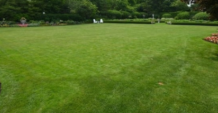During the short days of winter, houseplant growth slows, resulting in a
need to change how we care for them. Although frequent watering may have
been necessary during the long days of summer, the same amount now could
cause problems. Excess water fills air spaces within the soil resulting in
roots that receive less oxygen than they need. Water by touch, not by
calendar. If the soil is dry an inch deep, it is time to water. Be sure to
add enough so that some water flows out the bottom of the pot. This will
help wash out excess salts that tend to accumulate within the potting
soil.Fertilization also should be reduced. Normally, it is best to apply
half the amount of fertilizer for flowering houseplants and one-fourth the
amount for foliage houseplants. Too much fertilizer results in plants that
become leggy and weak. Location is another factor that should be considered
this time of year. Since day length is so short, houseplants may be helped
by being moved to areas of the room that receive more light, such as a
south-or east-facing window.
Avoid placing plants where drafts from doors or direct output from heating
ducts may contact them. Relative humidity also tends to be low during the
winter. If you do not have a humidifier, frequent misting of the plants or
placing them on water-filled trays of pebbles can help raise the humidity.
By: Ward Upham




